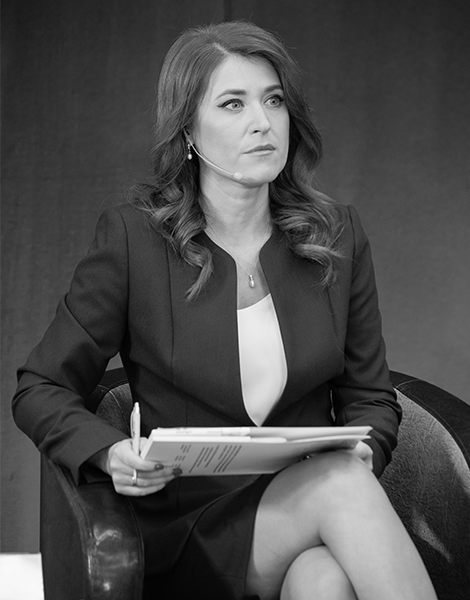“We didn’t only manage to survive, but we’re developing and expanding steadily,” Mariana Raţă says.
“When the Russian-Ukrainian war started, we got a 300 percent audience surge,” she adds, “People came to us looking for credible information.”
Mariana is a Senior Editor at TV8, an award-winning TV channel in Moldova. Since its launch in 2017, the media has consistently been rated among the most transparent and trustworthy TV channels in the country.
“We create a lot of our original content, unlike many Russian and oligarch-owned media in Moldova,” Mariana explains, “We want to produce even more so we can compete with them for more audience and more visibility.”
TV8 has been at the forefront of covering major events affecting Moldova’s politics and society. It’s been covering the country’s “silent revolution”, ongoing anti-government protests, and the Russo-Ukrainian war which is just on Moldova’s border. In addition, the channel runs the country’s only investigative TV program, “Cutia Neagra”, or “Black Box.” EED support also means that Mariana and her colleagues are able to investigate big corruption in Moldova.
“Last year, we uncovered that one of Moldova’s biggest oligarchs had earned more than 50 milllion Euros on illegal passport deals,” the journalist says, “And while we cannot punish him or others who rob Moldovans, we can inform people and uncover more.”
Tough competition
Moldova’s TV market is quite big for a country with less than three million residents. There are around 70 TV channels; most of them in Russian, and some run content in Romanian or in both languages. Various media are owned by oligarchs, and some are just Moldovan versions of Russian channels – they broadcast the same content as in Russia, with few changes. These media have more resources than independent platforms, which makes it harder to compete with them.
“Propaganda channels have more money, so they run expensive entertainment content that lures people in,” the journalist says.
“It is a vicious circle for any independent media like us,” she adds, “We struggle to produce entertainment content because we don't have as much money, and we get less ads because the audience ratings are rigged. So donors like EED help us compete with Russian propaganda channels on the TV market.”
Propaganda channels can function freely in Moldova, despite an unsuccessful attempt to control them. In December 2022, Moldova’s Commission for Emergency Situations suspended the broadcasting of six pro-Russian TV channels for disinformation, however, they quickly found a way to bypass this ban. RTR Moldova, which transmits Russia-made content, now shows all its programmes on another channel, Cinema 1. Similar tactics have been used by other banned platforms.
“If nothing changes in the way the government tackles this problem, we may have this scenario forever,” Mariana says. “These channels can buy new platforms or change logos forever to keep broadcasting their toxic content.”
Tackling the problem
To address these challenges, TV8 is working on more quality entertainment content. The newsroom also added more programming in Russian after the start of the full-scale invasion of Ukraine.
“People seek us out whenever something important happens in the country,” she explains. “As we’re a young and dynamic team, we’re able to adapt to needs quickly. For instance, we’re one of the few independent TV stations that added more content in Russian following Russia's full-scale invasion of Ukraine.”
TV8 also has a team on the ground in Ukraine, Mariana explains that without this content, Russian speakers in Moldova would look for information elsewhere, such as in Russian media.
“Proximity to this war affects us hugely,” Mariana says. “We make sure our colleagues in Ukraine are as safe as possible given the situation. We bought them a bulletproof car, and we are in regular communication. At the same time, we’ve prepped ourselves so if there is a spill over war in Moldova, we’ll be able to continue working.”
The newsroom also covers all Moldova-themed events and makes sure to give context to what’s happening.
“We want our audience to be able to differentiate between the actual reality and the falsified one,” Mariana adds, “For example, many pro-Russian protesters against the government were funded by the pro-Russian parties. While we cover these protests, we also provide people with background information.”
Innovating and expanding
Mariana and her colleagues hope that Moldova’s TV market will become more transparent to facilitate the work of independent media.
“We do not need privileges,” she says. “We want the laws to protect those creating original local content instead of those simply rebroadcasting Russian channels.”
She hopes that Moldova’s government will improve its access to the market under the information law currently under review.
“With Moldova’s European integration, there is a new legislation that may limit public access to different types of data,” Mariana explains, “We are very critical of this, and we’re constantly reminding the government to improve the draft of the law.”
Another big objective is to carry out more investigations.
“Last year, we created an investigative department thanks to EED’s support,” Mariana says, “It produces one of our most popular talk shows. Every week, we publish a small documentary, which is quite unique for Moldova.”
Mariana’s team investigated potential judges for the country’s top court. It also monitors big investment, politicians, and government officials. Thanks to this work, criminal cases were opened and exposed candidates were not given political posts.
“We would not be able to launch this very important project without EED,” Mariana says. “Doing investigations is expensive and requires time, and EED helped us remain as independent as possible. We became more vocal and bigger thanks to this support.”
This article reflects the views of the grantee featured and does not necessarily represent the official opinion of the European Endowment for Democracy, the European Commission or any other European State or other contributors to EED.
